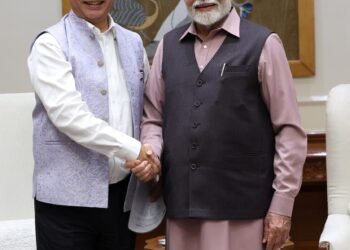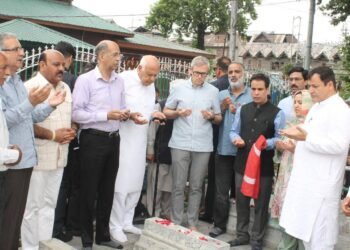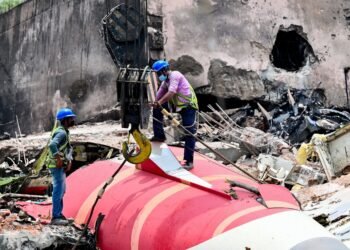In the wake of a violent crackdown, the Kuki-Zo Council leads a mass shutdown, demanding accountability for the fatal shooting of a young protestor. As accusations fly between authorities and activists, the fight for justice intensifies.
BY PC Bureau
The demand for the immediate transfer of Kangpokpi Superintendent of Police (SP) has intensified, with the Kuki-Zo community holding him responsible for the killing of 22-year-old Lalgouthang Singsit and the destruction of homes, an ambulance, and private vehicles in Keithelmanbi Military Colony.
Ng. Lun Kipgen, spokesperson for the Committee on Tribal Unity (CoTU), has directly accused the SP of orchestrating the violence, calling on the Governor to take swift action. “His removal is necessary to restore peace in the district,” Kipgen asserted, as tensions remain high in violence-hit Kangpokpi.
Indefinite Shutdown: Test of Resolve on Monday
The Kuki-Zo community’s determination to enforce an indefinite shutdown—protesting the killing of Singsit and the injury of at least 50 others, mostly women—will be put to the test on Monday.
With Sunday observed as a day of rest, businesses, shops, and offices remained closed, while public transport stayed off the roads. Despite the government’s decision to allow free movement across the state, no private vehicles from Imphal passed through Kangpokpi.
Monday, however, will be crucial. It remains to be seen how far Kuki-Zo protestors will go in blocking roads and enforcing the shutdown.
Manipur’s Double Standards: One Law for Kuki-Zos, Another for Nagas, Meiteis, UNLF, and Arambai Tenggol
ALSO READ: Opinion: Prosecute Th. Manihar for March 8 Violence
Rising Tensions and Reinforced Security
The Indigenous Tribal Leaders’ Forum (ITLF) has backed the shutdown, urging people to stand in solidarity. Security forces have been reinforced in Gamgiphai and other sensitive areas along NH-2 (Imphal-Dimapur Road) to maintain order.
The shutdown, spearheaded by the Kuki-Zo Council (KZC) in Sadar Hills, Kangpokpi District, Manipur, was triggered by Singsit’s fatal shooting during a clash with security forces at Keithelmanbi Military Colony on March 8. The protest, which began at midnight that day, has paralyzed Kuki-Zo-dominated areas.
Hundreds of Kuki-Zo women have taken to the streets, ensuring strict compliance, while all commercial establishments, educational institutions, and private offices remain closed. Only emergency services are allowed under the supervision of women volunteers.
Meeting of Key Civil Society Groups
A high-level meeting at Keithelmanbi Military Colony brought together key civil society organizations, including CoTU, Kuki Inpi, and the Kuki Students’ Organization (KSO). While the meeting’s resolutions remain undisclosed, the groups confirmed their refusal to claim Singsit’s body, which remains in the District Hospital Kangpokpi morgue.
Meanwhile, Kuki-Zo women gathered at the hospital to mourn, intensifying calls for justice.
Manipur’s Double Standards: One Law for Kuki-Zos, Another for Nagas, Meiteis, UNLF, and Arambai Tenggol
Manipur: The Kuki Women Organisation for Human Rights (KWOHR) condemns the action of central security forces against the peaceful Kuki women protestors at Gamgiphai and the killing of Lalgouthang Singsit at Keithelmabi, Kangpokpi, on March 8, 2025.@volker_turk @India_NHRC… pic.twitter.com/XS85Q4ryc4
— Sumkawn (@Sumkawn) March 9, 2025
Manipur Police’s Defense and Clashes
Amidst growing outrage, the Manipur Police have claimed that armed miscreants among the protestors opened fire on security forces, prompting retaliation.
In an official statement, the police alleged that security forces faced heavy stone-pelting, catapult attacks, and gunfire from protestors. “There were incidents of firing from among the protestors towards the security forces, in which the security forces retaliated,” the statement read, adding that forces exercised “tremendous restraint” and used “minimal force” to control the situation.
The statement also dismissed allegations from the Kuki-Zo Council and KSO that security forces had escorted protestors, calling these claims “totally baseless and false.”
Political Fallout: Manihar’s Resignation Sparks Controversy
Meanwhile, Manipur has been rocked by a major scandal following a viral social media post that forced the resignation of Th. Manihar, President of the Federation of Civil Society Organisations (FOCS) Manipur.
Manihar stepped down, taking “moral responsibility” for a statement he made during the so-called Peace Rally (Shantigi Paojel Puba Khongchat) on March 8—remarks that exposed his deep-seated animosity toward the Kuki-Zo community. His resignation has reinforced allegations that the “March to the Hills” was, in reality, a covert attempt to incite unrest in Manipur.
Kuki-Zo groups had strongly opposed the rally from the outset, fearing it was a provocation disguised as a peace march. The controversy surrounding Manihar’s departure raises concerns about a deeper conspiracy to manufacture a law-and-order crisis in Manipur. Given the severity of his remarks, his resignation alone is insufficient—he must be held accountable.
Incidentally, hundreds across the country face imprisonment for far lesser charges of inciting unrest. If the law applies to them, it must apply to Manihar as well.













